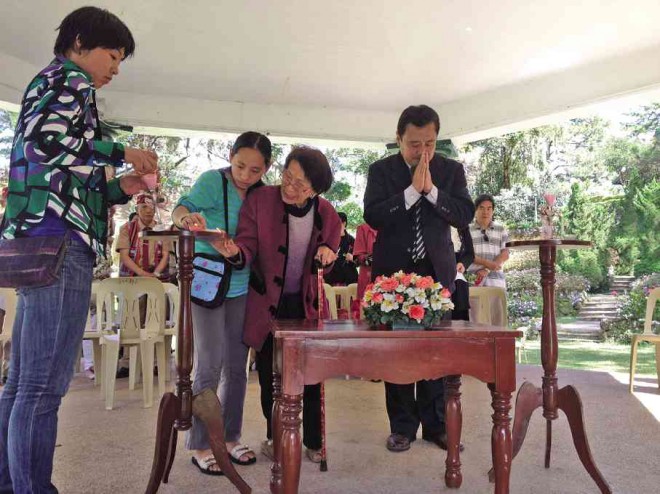Flowers, new song for 72nd year of Baguio war bombings

IGOROT veterans of the 66th Infantry Regiment light candles and offer roses at a peace memorial dedicated to the atrocities of World War II 72 years ago at Camp John Hay’s Bell Amphitheater in Baguio City. VINCENT CABREZA/INQUIRER NORTHERN LUZON
BAGUIO CITY—War veterans and peace advocates launched a new Joey Ayala song on Saturday at Camp John Hay’s Bell Amphitheater here to promote a 4-year-old crusade that hoped to transform the brutalities of World War II into lessons that would inspire a new generation of Filipinos to renounce violent conflicts.
The song, “Open Hands,” was written specifically for the 4th Asia Pacific International Peace Memorial. It was played at a ceremony attended by three uniformed Igorot members of the 66th Infantry Regiment and the city’s first female mayor.
The soldiers, former Baguio Mayor Virginia de Guia and Baguio-based Japanese filmmaker Koji Imaizumi gathered with a handful of Baguio pioneers to commemorate the day the first bombs struck the place at the start of the Pacific war on Dec. 8, 1941.
The summer capital was one of the first Asian cities to be attacked by the Japanese immediately after Japan bombed Pearl Harbor in Hawaii in December 1941.
The attacks prompted the United States to join the war.
“Peace is all the earth we need to stand/We are in a garden made of open hands,” went Ayala’s song while the memorial’s participants offered roses and prayers to the war’s fallen.
The event advocates unification, which retired Army
Cpl. Raymundo Gadgad summed up in a prayer he read to the participants: “We pray that the next victories [that used to be] possible in war may be even bigger victories in peace … Grant us patience in planning with our fellow men a world that resolves its division through peaceful means.”
The Japanese had apologized for war atrocities in the Philippines and other Asian countries, “and we accept the apology, for that is the way a Christian lives,” Gadgad said.
The first Japanese bombing raid on Baguio took place in broad daylight on Dec. 8, 1941, targeting Camp John Hay and the Philippine Military Academy, according to Dr. Ricardo Jose, history professor at the University of the Philippines Diliman.
The first Baguio resident to learn that the war finally broke out was the son of former Baguio Mayor Eusebius Julius Halsema who was a correspondent of a news agency.
According to Jose, James Halsema hurried to the presidential mansion to inform Commonwealth President Manuel
L. Quezon who was convalescing in Baguio. As soon as the Cabinet confirmed the report, Quezon addressed the nation from the Mansion.
Jose said Baguio was already a cosmopolitan city before the outbreak of the war. In 1939, the city’s population count was 24,000. About 22,000 were Filipinos while the rest were Chinese, Japanese, Americans, Spanish, British and Germans.
Jose said the 500 Japanese residents of Baguio gave rise to conflicted sentiments after the Philippine military ordered their internment because of the Pacific war.
Some people hid their Japanese neighbors from the authorities but Jose said there was also “a great deal of anti-Japanese sentiment” shortly after the Japanese invasion. This resentment was expressed through the looting of Japanese-owned stores.
Japan eventually invaded the Philippines and used Camp John Hay as a its military base. “When (General Douglas) MacArthur came to liberate the Philippines, the Japanese in Baguio had to be evacuated,” said Inosuke Furuya who was born in Baguio in 1933.
“We followed (General Tomoyuki) Yamashita’s escape route from Km 21 in the Mountain Trail, to Bayombong and Solano in Nueva Vizcaya, then eventually to Kiangan in Ifugao,” Furuya said.
Baguio was again attacked, this time by American bombers, which flattened the city in 1945.
“There were more Filipino civilian fatalities in the bomb runs,” Jose said.
De Guia said she survived by staying in Baguio Cathedral, which was spared from the bombings. Vincent Cabreza, Inquirer Northern Luzon, with a report from Roland Rabang, Contributor